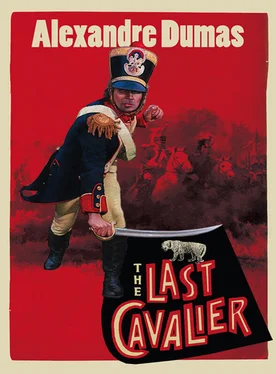“So yesterday,” the man from Bordeaux continued, “how did it happen, then, that along with the government’s money they also carried off a bag containing two hundred louis that belonged to me?”
“My dear sir,” the young man answered, “I’ve already told you that there must have been some mistake, and as sure as my name is Alfred de Barjols, that money will be returned to you some day.”
The wine merchant sighed deeply and shook his head like a man who, in spite of the reassurances people are giving him, still is not totally convinced.
But at that moment, as if the guarantee given by the young man who had revealed his own name and social rank had awakened the sensibilities of those for whom he was giving his guarantee, a horse galloped up to the front door. They could hear footsteps in the corridor; the dining room door was flung open, and a masked man, armed to the teeth, appeared in the doorway.
All eyes turned to him.
“Gentlemen,” he said, his voice breaking the deep silence that greeted his unexpected appearance, “is there among you a traveler named Jean Picot who was in the stagecoach that was stopped between Lambesc and Port-Royal by the Companions of Jehu?”
“Yes,” said the wine merchant in astonishment.
“Might you be that man, monsieur?” the masked man asked.
“That’s me.”
“Was nothing taken from you?”
“Yes, there was. I had entrusted a sack of two hundred louis to the coachman, and it was taken.”
“And I must say,” added Alfred de Barjols, “that just now this gentleman was telling us about his misfortune, considering his money lost.”
“The gentleman was mistaken,” said the masked stranger. “We are at war with the government, not with ordinary citizens. We are partisans, not thieves. Here are your two hundred louis, monsieur, and if ever a similar error should take place in the future, just remember the name Morgan.”
And with those words the masked man set down a bag of gold to the right of the wine merchant, politely said good-bye to those seated around the table, and walked out, leaving some of them in terror and the others in stupefaction at his daring.
At that moment word came to Bonaparte that the horses were harnessed and ready.
He stood and asked Roland to pay.
Roland dealt with the hotel keeper while Bonaparte got into the coach. Just as Roland was about to join his companion, he found Alfred de Barjols in his path.
“Excuse me, monsieur,” the young man said to him. “You were beginning to say something to me, but the word never left your lips. Might I know what kept you from pronouncing it?”
“Oh, monsieur,” said Roland, “the reason I held it back was simply that my companion pulled me back down by my coat pocket, and so as not to be disagreeable to him, I decided not to call you a fool.”
“If you intended to insult me in that way, monsieur, might I therefore consider that you have now done so?”
“If that should please you, monsieur.…”
“That does please me, because it offers me the opportunity to demand satisfaction.”
“Monsieur,” said Roland, “we are in a great hurry, my companion and I, as you can see. But I will be happy to delay my departure for an hour if you think one hour will be enough to settle this question.”
“One hour will be sufficient, monsieur.”
Roland bowed and hurried to the coach.
“Well,” said Bonaparte, “are you going to fight?”
“I could not do otherwise, General,” Roland answered. “But my adversary appears to be very accommodating. It should not take more than an hour. I shall hire a horse as soon as this business is over and shall surely catch up with you before you reach Lyon.”
Bonaparte shrugged.
“Hothead,” he said. And then, reaching out his hand, he added, “Try at least not to get yourself killed. I need you in Paris.”
“Oh, relax, General. Somewhere between Valence and Vienne I shall come tell you what happened.”
Bonaparte left.
About one league beyond Valence he heard a horse galloping behind him and ordered the coachman to stop.
“Oh, it’s you, Roland,” he said. “Apparently everything went well?”
“Perfectly well,” said Roland as he paid for his horse.
“Did you fight?”
“Yes, I did, General.”
“How?”
“With pistols.”
“And?”
“And I killed him, General.”
Roland took his place beside Bonaparte and the coach set off again at a gallop.
IV The Son of the Miller of La Guerche
BONAPARTE NEEDED ROLAND in Paris to help him organize the 18th Brumaire. Once the 18th Brumaire was over, what Bonaparte had heard and seen with his own eyes at the common table in Avignon came back to him. He resolved to do all he could to track down the Companions of Jehu and try to bring Cadoudal around to support the Republic.
It was Roland to whom Bonaparte entrusted that mission.
Roland left Paris, gathered some information in Nantes, and took the road toward La Roche-Bernard. There, he was able to get information that sent him to the village of Muzillac. For that is where Cadoudal could be found.
Let us enter the village with Roland. Let us walk up to the fourth thatched-roof house on the right and look in through an opening in one of the shutters. There we see a man dressed like a rich Morbihan peasant. His collar, his lapels, and the edges of his hat are trimmed with one gold stripe the width of a finger. His clothing is made of gray wool, with a green collar. His outfit is complete with Breton suspenders and leather gaiters coming up nearly to his knees. His saber is lying on a chair, and on the table a pair of pistols are within reach. The blaze in the fireplace reflects off two or three gun barrels.
The man is seated at the table. Light from a lamp shines on his face and on some papers he is attentively reading. His expression is open and joyous. Curly blond hair frames his face, his bright blue eyes give it life, and when he smiles, he displays two rows of white teeth that clearly have never needed to be touched by a dentist’s brush or tools. He is nearly thirty years old.
Like his fellow countryman Du Guesclin, he has a large, round head. Consequently, he is as well known by the name General Tête-Ronde as he is by the name George Cadoudal.
George was the son of a farmer in the parish of Kerléano. He had just finished an excellent education in the secondary school in Vannes when the Royalist insurrection’s first appeals were made. Cadoudal responded, gathered together his hunting and partying companions, led them across the Loire, and offered his services to Stofflet.
But Monsieur de Maulevrier’s former game warden had his prejudices. He did not like nobility and liked the bourgeoisie even less. Before agreeing to take Cadoudal, he wanted first to see him at work, and Cadoudal asked for nothing more.
Already the next day there was combat. When Stofflet saw Cadoudal charge the Blues without concern for their bayonets or guns, he could only say to Monsieur de Bonchamps, who was standing beside him, “If some cannonball doesn’t carry off that tête ronde , he will make a name for himself.” The name stuck with him.
George fought in the Vendée until Savenay was routed, when half of the Vendée army died on the battlefield and the other half faded away like smoke.
After three years of prodigious feats of strength, skill, and courage, he crossed back over the Loire and returned to the Morbihan.
Once back on his native soil, Cadoudal fought on his own account. As general-in-chief, he was adored by his soldiers, who obeyed him at a simple signal. Thus Stofflet’s prophecy came true. Replacing La Roche-Jacquelein, d’Elbee, Bonchamps, Lescure, Charette, and even Stofflet himself, Cadoudal became their chief rival in glory and their superior in force. He alone continues to fight against the government of Bonaparte, who has been consul for two months and is now about to leave for Marengo.
Читать дальше












